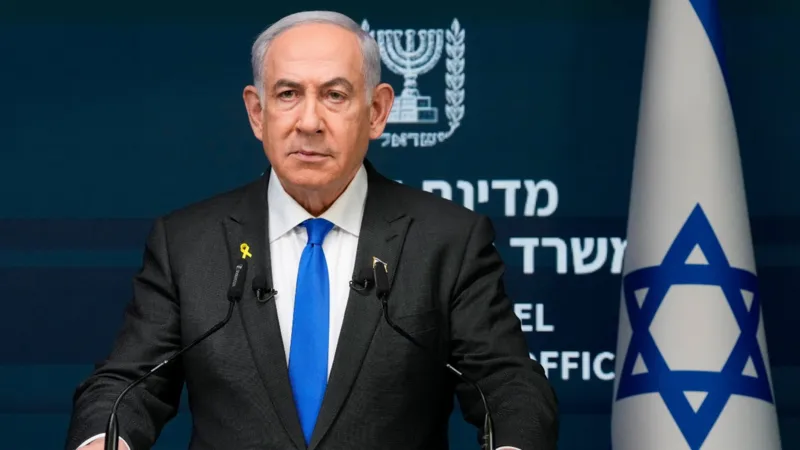JERUSALEM — Israeli Prime Minister Benjamin Netanyahu has come under intense scrutiny after he publicly “apologized” after the bodies of six hostages were found in Gaza. The hostages, who had been missing since being kidnapped by Hamas nearly 11 months ago, were found dead on Saturday, sparking outrage and grief across Israel. As the situation escalates, Hamas has warned that more hostages could suffer the same fate if a ceasefire is not reached, leaving many Israelis angry and fearful.
Netanyahu’s comments followed a wave of protests for two consecutive nights, with citizens taking to the streets to express their frustration that his government has failed to negotiate the safe return of their loved ones. The growing unrest reflects deep public dissatisfaction with Netanyahu’s approach to the hostage crisis and his handling of the conflict with Hamas more broadly.
Protests have intensified across Israel
Thousands of demonstrators gathered outside the prime minister’s residence in Jerusalem on Monday to demand accountability and action from the government. Clashes broke out between protesters and police during the protest, with police reportedly using significant force to disperse the crowd. The Times of Israel described scenes of police violently pushing protesters, knocking some to the ground and dragging several people away. A police officer reportedly choked a journalist from the newspaper during the chaos.
The anger sparked a huge wave of demonstrations that saw hundreds of thousands of Israelis march across the country on Sunday. Protesters blocked major highways, including Tel Aviv’s Ayalon Highway, waving Israeli flags and displaying yellow ribbons as a symbol of solidarity with the remaining hostages. Currently, 97 hostages are unaccounted for after Hamas seized them during an unprecedented attack on Israel on October 7 last year.
Talks for hostages reach tense impasse
On Monday, Hamas issued a stark warning, threatening that the hostages would be “returned in coffins” if Israel’s military pressure continued. The group claimed that “new instructions” had been issued to militants guarding the hostages to rescue them if they encounter Israeli troops. A Hamas spokesman said, “Netanyahu’s insistence on using military force instead of negotiating a deal means that they will be returned to their families in coffins,” further fuelling fear among the hostages’ families.
Meanwhile, Israel’s largest trade union, the Histadrut, announced a general strike involving hundreds of thousands of workers, putting additional pressure on the government to reach a ceasefire deal with Hamas. Despite the strike, the situation in Tel Aviv remained relatively calm, with the city’s Ben Gurion Airport and most businesses operating as normal. Right-wing Finance Minister Bezalel Smotrich dismissed the strike, claiming that Israelis have gone to work “in large numbers” and are no longer influenced by “political needs”.
International reactions and diplomatic efforts
The international community has also been increasingly critical of Netanyahu’s handling of the crisis. US President Joe Biden has reportedly urged the Israeli leader to make more efforts to secure the release of hostages and a ceasefire with Hamas, hinting that a final proposal could be considered soon. Some analysts argue that Netanyahu’s reluctance to finalise a deal may be linked to concerns about his political survival, as his right-wing allies in the coalition government have threatened to withdraw support if he accepts any agreement, including a ceasefire, before Hamas is completely defeated.
Mediation efforts by the U.S., Egypt and Qatar are ongoing, with negotiators attempting to broker a deal that would see the release of 97 hostages still held by Hamas in exchange for the release of Palestinian prisoners currently held in Israeli jails. 33 of these hostages are feared dead.
U.K. suspends arms exports to Israel
Increasing the pressure, the U.K. has suspended 30 of its 350 licenses for arms exports to Israel, citing a “clear risk” that these devices could be used in ways that violate international law. The suspended items include parts for fighter jets, helicopters and drones. While U.K. Foreign Secretary David Lammy stressed that the suspension is not an arms ban and that the U.K. will continue to support Israel’s right to self-defense, the move has disappointed Israeli officials. Defense Minister Yoav Galant said he was “deeply disappointed,” and Foreign Minister Israel Katz called the decision “problematic,” suggesting it sends the wrong message to Hamas and Iran.
Mourning for hostages
Meanwhile, mourning in Israel has turned into a public mourning ritual. On Monday, funeral services were held for some of the hostages who died on Saturday. One of them was Hersh Goldberg-Polin, whose mother, Rachel Goldberg-Polin, was a member of the Israel Defense Forces.
